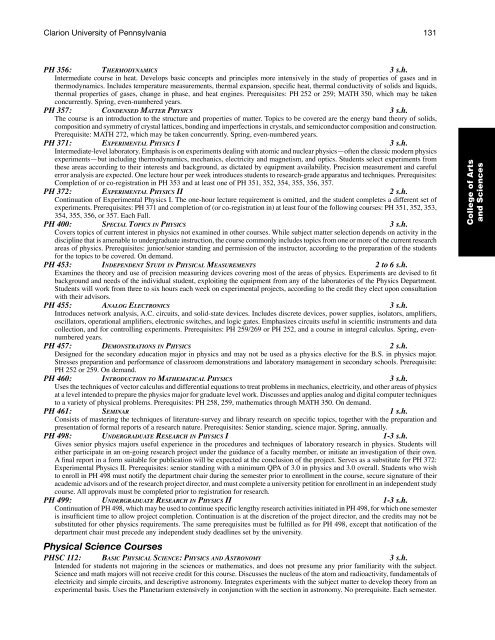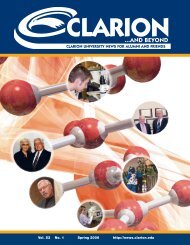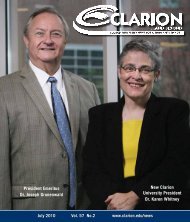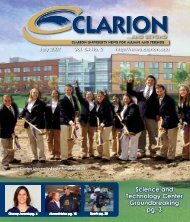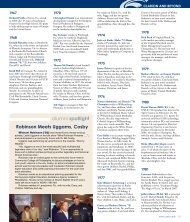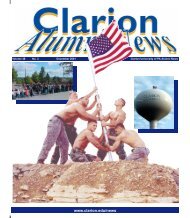Undergraduate - Clarion University
Undergraduate - Clarion University
Undergraduate - Clarion University
- No tags were found...
Create successful ePaper yourself
Turn your PDF publications into a flip-book with our unique Google optimized e-Paper software.
<strong>Clarion</strong> <strong>University</strong> of Pennsylvania 131PH 356: Thermodynamics 3 s.h.Intermediate course in heat. Develops basic concepts and principles more intensively in the study of properties of gases and inthermodynamics. Includes temperature measurements, thermal expansion, specific heat, thermal conductivity of solids and liquids,thermal properties of gases, change in phase, and heat engines. Prerequisites: PH 252 or 259; MATH 350, which may be takenconcurrently. Spring, even-numbered years.PH 357: Condensed Matter Physics 3 s.h.The course is an introduction to the structure and properties of matter. Topics to be covered are the energy band theory of solids,composition and symmetry of crystal lattices, bonding and imperfections in crystals, and semiconductor composition and construction.Prerequisite: MATH 272, which may be taken concurrently. Spring, even-numbered years.PH 371: Experimental Physics I 3 s.h.Intermediate-level laboratory. Emphasis is on experiments dealing with atomic and nuclear physics—often the classic modern physicsexperiments—but including thermodynamics, mechanics, electricity and magnetism, and optics. Students select experiments fromthese areas according to their interests and background, as dictated by equipment availability. Precision measurement and carefulerror analysis are expected. One lecture hour per week introduces students to research-grade apparatus and techniques. Prerequisites:Completion of or co-registration in PH 353 and at least one of PH 351, 352, 354, 355, 356, 357.PH 372: Experimental Physics II 2 s.h.Continuation of Experimental Physics I. The one-hour lecture requirement is omitted, and the student completes a different set ofexperiments. Prerequisites: PH 371 and completion of (or co-registration in) at least four of the following courses: PH 351, 352, 353,354, 355, 356, or 357. Each Fall.PH 400: Special Topics in Physics 3 s.h.Covers topics of current interest in physics not examined in other courses. While subject matter selection depends on activity in thediscipline that is amenable to undergraduate instruction, the course commonly includes topics from one or more of the current researchareas of physics. Prerequisites: junior/senior standing and permission of the instructor, according to the preparation of the studentsfor the topics to be covered. On demand.PH 453: Independent Study in Physical Measurements 2 to 6 s.h.Examines the theory and use of precision measuring devices covering most of the areas of physics. Experiments are devised to fitbackground and needs of the individual student, exploiting the equipment from any of the laboratories of the Physics Department.Students will work from three to six hours each week on experimental projects, according to the credit they elect upon consultationwith their advisors.PH 455: Analog Electronics 3 s.h.Introduces network analysis, A.C. circuits, and solid-state devices. Includes discrete devices, power supplies, isolators, amplifiers,oscillators, operational amplifiers, electronic switches, and logic gates. Emphasizes circuits useful in scientific instruments and datacollection, and for controlling experiments. Prerequisites: PH 259/269 or PH 252, and a course in integral calculus. Spring, evennumberedyears.PH 457: Demonstrations in Physics 2 s.h.Designed for the secondary education major in physics and may not be used as a physics elective for the B.S. in physics major.Stresses preparation and performance of classroom demonstrations and laboratory management in secondary schools. Prerequisite:PH 252 or 259. On demand.PH 460: Introduction to Mathematical Physics 3 s.h.Uses the techniques of vector calculus and differential equations to treat problems in mechanics, electricity, and other areas of physicsat a level intended to prepare the physics major for graduate level work. Discusses and applies analog and digital computer techniquesto a variety of physical problems. Prerequisites: PH 258, 259, mathematics through MATH 350. On demand.PH 461: Seminar 1 s.h.Consists of mastering the techniques of literature-survey and library research on specific topics, together with the preparation andpresentation of formal reports of a research nature. Prerequisites: Senior standing, science major. Spring, annually.PH 498: <strong>Undergraduate</strong> Research in Physics I 1-3 s.h.Gives senior physics majors useful experience in the procedures and techniques of laboratory research in physics. Students willeither participate in an on-going research project under the guidance of a faculty member, or initiate an investigation of their own.A final report in a form suitable for publication will be expected at the conclusion of the project. Serves as a substitute for PH 372:Experimental Physics II. Prerequisites: senior standing with a minimum QPA of 3.0 in physics and 3.0 overall. Students who wishto enroll in PH 498 must notify the department chair during the semester prior to enrollment in the course, secure signature of theiracademic advisors and of the research project director, and must complete a university petition for enrollment in an independent studycourse. All approvals must be completed prior to registration for research.PH 499: <strong>Undergraduate</strong> Research in Physics II 1-3 s.h.Continuation of PH 498, which may be used to continue specific lengthy research activities initiated in PH 498, for which one semesteris insufficient time to allow project completion. Continuation is at the discretion of the project director, and the credits may not besubstituted for other physics requirements. The same prerequisites must be fulfilled as for PH 498, except that notification of thedepartment chair must precede any independent study deadlines set by the university.Physical Science CoursesPHSC 112: Basic Physical Science: Physics and Astronomy 3 s.h.Intended for students not majoring in the sciences or mathematics, and does not presume any prior familiarity with the subject.Science and math majors will not receive credit for this course. Discusses the nucleus of the atom and radioactivity, fundamentals ofelectricity and simple circuits, and descriptive astronomy. Integrates experiments with the subject matter to develop theory from anexperimental basis. Uses the Planetarium extensively in conjunction with the section in astronomy. No prerequisite. Each semester.pages i-viiCollege of Artsand Sciences


